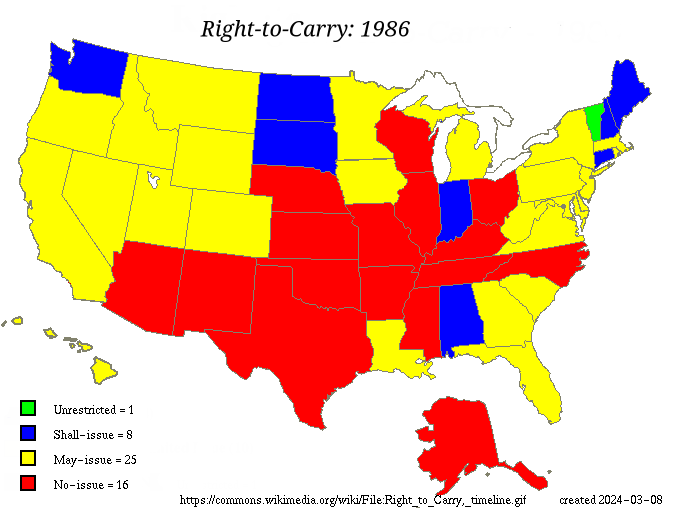On 27 February, 2020, at 1 p.m., Governor Bill Lee announced he is proposing Constitutional Carry for Tennessee in 2020.Both Senate Majority Leader Jack Johnson and House Majority Leader William Lampeth endorsed the idea of Constitutional Carry. A specific statute was not in place when the announcement was made. With all three leaders endorsing the popular idea of Constitutional Carry, a bill seemed almost certain of passage. From tn.gov:
“I applaud Governor Lee’s commitment to Tennesseans’ Second Amendment rights guaranteed by our U.S. and state constitutions. This proposal will reduce barriers to ensure citizens have the ability to protect themselves and their families, while imposing stiffer penalties against criminals who possess guns illegally,” said Senate Majority Leader Jack Johnson.The United States started 2020 with 16 states which have close approximations of Constitutional Carry.
“This constitutional carry package is historic because not only does it uphold the freedoms granted to us by our nation’s founding fathers, it also imposes mandatory minimum sentencing guidelines on bad guys who illegally obtain or use handguns,” said House Majority Leader William Lamberth. “I want to thank the National Rifle Association for their work over the years in making today a reality, and I look forward to working with Governor Lee, as well as my House and Senate colleagues to get Constitutional Carry passed in Tennessee.”
Constitutional Carry is when residents are not required to have a government permit in order to carry loaded handguns in most public places, either concealed or openly. This was the state of the law when the Second Amendment was ratified in 1791. It wasn't until a generation later that politicians started to infringe on Second Amendment rights, primarily with bans on carrying concealed weapons, then later, after the War Between the States, with requiring permits to carry.
In the 2020 legislative session in Tennessee, several bills were submitted, with considerable differences. Then, the Covid-19 virus, or Wuhan Flu, caught the attention of the legacy media and federal, state, and local governments.
On 19 March, 2020, the Tennessee legislature temporarily recessed, stopping legislative action. Constitutional Carry, which had been endorsed by the Governor, the majority leader in the House, and the Majority leader in the Senate, is dead in the water. The legislature hopes to resume the session on 1 June. From tenessean.com:
The Tennesee legislature was scheduled to be in session from 14 January, 2020, to 1 May, 2020. It is unknown how long the legislature may be in session after resuming the session on 1 June.Although lawmakers hope to return as early as June 1, the continued uncertainty of coronavirus has led some members to wonder when it might be safe to return to Nashville to continue their business for the year.
The legislature passed the budget on 19 March; there is little incentive for them to take up much work. 2020 is an election year, and legislators will wish to get out and campaign. Republicans hold supermajorities in both houses, so Democrats have incentive to limit the session as much as possible. Actions on HB2817, and SB2671 were put on hold as of 18 and 17 of March, respectively.
This shows how events can derail the best laid plans. No one planned for a pandemic to shut down the legislature for over two months.
How high a priority passage of Constitutional Carry was to the legislature is unknown. If it had been a priority, it could have been passed rather quickly.
Tennessee Firearms Association has lobbied for the least restrictive version of Constitutional Carry, the Governor and legislative leaders version would include increased penalties for theft of firearms and possession by currently prohibited possessors.
It is possible a version of Constitutional Carry will be passed into law in 2020; if it does, it will be because of strong lobbying by Second Amendment supporters.
©2020 by Dean Weingarten: Permission to share is granted when this notice and link are included.
Gun Watch

Where in the sentencing phase of a trial does it say after you serve the time for this conviction you will never be able to join society again, you will never have the right of self defense again, you will never be permitted to protect your family again, you are no longer considered a human with any rights? The law specifies what the penalty is for violating a given law. You pay that penalty once not every day of your life after the sentence ends. The penalty is intended to correct your behavior. If you cant correct your behavior you get sentenced again. No one under our constitution is guaranteed success. it only guarantees the right to try to be successful. if you can not rejoin society after serving your sentence where is the right to try? If you are not behind bars you suffer the same threats as any one else, Your family is in just as much danger as any one else. when the court ordered sentence is served that is the end of the punishment. why is punishment allowed to continue after you have met the requirements of the law? If you are not fit to rejoin society then hang you and get you out of society. once the sentence is over, start over. You cant start over with a severe handicap. You paid your debt. Say you buy a car how many times do you have to pay for that car. when it is paid for it is paid for. Period. If you are not rehabilitated that is the fault of the system. What is different about a person standing on one side of the street and a person standing on the other side of the street when a drive by shooter is shooting at both sides of the street. If prisons worked there would be no repeat offenders. When you complete your sentence it is behind you not in front of you for the rest of your life.
ReplyDelete